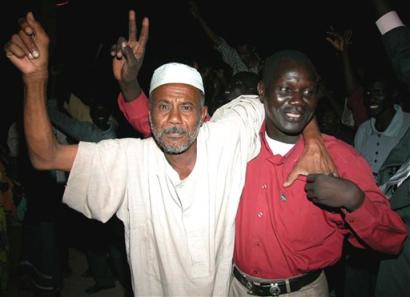Sudanese see unity possible with good will

By Nima Elbagir
KHARTOUM, May 27 (Reuters) – On the streets of the capital, Sudanese welcomed on Thursday a landmark agreement between the government and southern rebels and many predicted that with good will and creative thinking the vast country could hold together.
The agreement, signed in Kenya on Wednesday, paves the way to a comprehensive end to a civil war which has raged for 21 years in the south of Sudan killing some two million people, mainly through famine and disease wrought by fighting.
The war has crippled economic development in one of the world’s poorest countries and set ethnic group against ethnic group in a land with more than 140 languages.
The deal does not cover another conflict in Sudan’s western Darfur area which has triggered a fresh humanitarian crisis.
Under the agreement, the mainly African south will have the right to independence from the Arab and Muslim north after a transitional period of six years.
In Khartoum, ordinary Sudanese reflected the view of the government and the rebel Sudan People’s Liberation Army that the war has not irreparably destroyed chances for national unity.
“Now we must work on our society and on the concepts of social and ethnic privilege that are dominant within it. If we do that, then we will remain united,” said Raja Ahmed al-Tayyeb, 30, a graphics designer from the north.
“If we dismantle the dominance of one social group over another, we will be able to move on together,” she added.
The leaders of the southern rebels said they were fighting for a new Sudan in which the Arabs of the north would share power with the black Africans in the south.
NORTHERN DOMINATION
The Arabs, with their historic links to the civilisations of the Middle East, have dominated the politics of Sudan since independence in the 1950s. Southerners said they have tried to impose their language and religion on the south.
Tom Benjamin Akaya, a 21-year-old office worker from the far southern region of Equatoria, said that if peace held he would go home to the south and stay there.
“If peace comes it is good. We will remain united but southerners, I think, will want to stay in the south and only come and go from the capital,” he added.
Clement Ohide, a 35-year-old southerner, said: “I give thanks and hope God will help all of us and unite our hearts so we will stay together and develop our country.” Ohide is from the Dinka group, which provided most of the rebel force.
Yassir Abdullah, 33 from northern Sudan, said the details of the agreement on power-sharing and wealth-sharing were less important than the spirit behind implementation.
“The real issue is the building of trust between northerners and southerners,” he said.
“I have complete confidence that Sudan is big enough for all of us. We have to work to erase the cultural dominance of the north. If you don’t achieve that, then that could lead to secession by the south.”
But Ismail al-Tayyeb Gasmalsid, a 35-year-old driver, said that a peaceful and developed south, which holds much of Sudan’s potential oil wealth, would be better off than the north and would have no incentive to stay part of Sudan.
The south is greatly more fertile than the north because of the heavy rains. Much of the north is barren desert, merging into scrub and seasonal grassland as one moves southwards.
